His name was Pobornik.
He had never read The New York Times. He would never be able to recognize a classic “pyramid lead.” His hours were occupied by other pursuits: grazing, sleeping standing up for long stretches, swatting away insects with his long, swishy tail, crunching mounds of hay in that big conical face of his. And then there was that other thing…. Pobornik had probably never known any other kind of life, and so he probably thought that his day job at Moscow’s Horse Farm #1 was part of the natural biological mission of the adult males of his species.
Strange-looking men would come to his stable during the daytime, and begin massaging him in strange places. One would be tugging at a strap tied to his mouth, and pulling him this way and that, back and forth, and all the while that strange stroking would continue, and the air would be filled with strange smells, and he would feel a tickling at his ears as his huge body convulsed with volcanic tremors…. Then there would be a commotion, and the little men would be running back and forth and between his legs, fiddling with something. Then, before he knew it, it would all be over, and they would leave him alone in his stable again. Once again it was quiet; once again the insects, the pile of hay to be finished off, the long night of confusing visions and dreams as one slept on one’s hooves.
In the first week of February the little men came twice one day. They’d had an extra order. Pobornik never saw her, but a redheaded woman in her twenties arrived at the farm one chilly morning with a handful of money. In return, Pobornik’s handlers gave her a big black thermos.
The girl, normally an office secretary, worked for the eXile. She was buying Pobornik’s sperm because she’d been gruffly ordered to do so by the newspaper’s editors. They’d been vague about what they needed it for, saying only that they needed a large quantity of horse sperm for some prank they were planning. They gave her money and delivery instructions and little additional information. They didn’t specify which horse the sperm should come from, or how she should obtain it—that was a logistical problem that they left up to her.
She did what she could, and it was only by chance that the horse farm she contacted chose Pobornik for the job. Yes, they chose Pobornik, a 15-year-old dark bay stallion with what his trainers called “totally mediocre” genes, and the poor horse never knew. He never knew what those men were really doing to him in the stable, and he never knew that it was his giant dollop of hot yellow sperm that would end up covering the face of an unsuspecting American correspondent named Michael Wines—the Worst Journalist in Russia, year 2001.
|
The idea, as we originally conceived it amid a great deal of chuckling several months back, was simple. We would hold the March Madness tournament as usual, deciding a winner after five rounds. When it was over and a winner was declared, we’d throw a pie in his face in public somewhere. The winner, who almost by necessity had to be a person completely devoid of a sense of humor, would be enraged, but only up to a point: he would think he’d just been hit with a regular old cream pie, like the pie those Belgian “flanner” terrorists threw at Bill Gates.
That was where the funny part of the joke came in. It wouldn’t be just a regular old cream pie. It would be a cream pie made of horse sperm, and the winner wouldn’t know this until the rest of Moscow did, when we released the information in the next issue of the eXile—some time, it is to be presumed, after he’d finally managed to calm down from the initial attack, and long after he’d licked the sticky cream off his lips and swallowed it by the teaspoonful.
It wasn’t easy to keep the secret throughout those two months. It was a tense time for all of us. It even caused some serious stress in my personal home life. The huge, sleek, space-age looking black thermos had sat throughout all of February and March in the back of the bottom shelf of my refrigerator. It did not look like an ordinary kitchen thermos. It was an evil-looking thing, shiny and covered with unnecessary handles, a vessel that would have looked at home in a cryogenics lab or as the lead prop in a movie called Volatile Deadly Virus. And it sat there, week after week, surrounded by stacks of yogurts and rinds of cheese and all the other stuff my girlfriend Masha and I ate.
Masha was a trooper about it, but I could tell it bothered her. She tried her best to pretend it wasn’t there, and as long as she managed to do that, our home life was happy. But there were times when she’d bounce into the kitchen in search of something to drink and throw open the refrigerator door and see the thermos not only sitting there on the back shelf, but actually touching the two-liter bottle of diet soda she’d planned on opening. You could see the smile disappear from her face then, and I would imagine at these times that she was suddenly remembering all the things that had gone wrong between us in the past, and that she was once again having doubts about our future together.
|
I had never opened the thermos, and in fact had only touched it a few times during those months. I’d even made sure to be absent when it was first put in there. When we first came up with the idea at the eXile in early February I just left the keys to the apartment at the front desk and gave my secretary instructions to pick the thing up herself, and deliver it straight to my refrigerator while I was gone. I’d given her a fistful of cab fare the day before to go out to the horse farm we’d been negotiating with. When I came back home that afternoon, it was in there on that bottom shelf. The poor girl had had to carry a thermos full of equine sperm all the way across Moscow.
Then, finally, last week, it came time to open the thermos. The tournament winner had been determined, and the plan was finally underway. It was early in the afternoon last Wednesday. Ames and Krazy Kevin were on their way to my place—Kevin with an electric mixer and a recipe for cream pie.
I reached into the refrigerator, nudged the soda bottles and mustard jars out of the way, and pulled the thing out. Like all thermoses it had a plastic cup-like section on top, which hissed like a tennis ball can as I opened it. Nervously, I unscrewed the inner cap. I’d expected the contents to have congealed over the course of those two months. They hadn’t. The guys at Horse Farm #1 had sealed it in a plastic baggie, which I had to fish out with two pencil ends. When I finally got a corner of the bag into the mouth of the thermos, I reached down with a gloved hand and slowly pulled it out.
I gagged. It hadn’t congealed at all. It was still liquid. The bag contained a baseball-sized dollop of fresh, liquid horse sperm. It was an unnatural bright yellow color, almost greenish like B-movie radioactive fluid, and there were frothy bubbles swimming around the surface. For a long moment I just sat there alone in my kitchen, gloved arm extended, holding the thing and staring at it in horror and amazement. Then the doorbell rang. It was time to start cooking….
In May of 1990, reporter Kathy Kadane of the little-known Washington-based States News Service published an expose contending that the United States had assisted Indonesian ruler General Suharto in committing a massacre in 1965-66. A failed plot by the Indonesian communist party, the PKI, had left six senior military officials dead in October 1965. General Suharto took control of the country six days after the coup attempt, and immediately launched an army-run massacre of communists that left between 250,000 and 1 million people—mostly all civilians—dead.
Kadane’s report was based on interviews with officials who had worked at the U.S. embassy in Jakarta during that period. One official, former political officer Robert Martens, admitted to Kadane that he had supplied the Indonesian military with a list of 5,000 suspected communists, many of whom were subsequently assassinated. Kadane also quoted then-deputy CIA station chief Joseph Lazarsky as saying that the CIA had “contributed quite a bit” to Martens’s lists.
Kadane’s report first ran on May 19, 1990 (at first, in the tiny Spartanburg, S.C. Herald-Journal), and was almost immediately picked up by major papers across the country, including The Boston Globe, The Chicago Tribune, and The Washington Post. Kadane freely distributed recordings of her interviews to other reporters, with the result that many papers, including The Post, simply republished large parts of her report.
Conspicuously, however, The New York Times ignored the story entirely—at first. It wasn’t until nearly two months later, on July 12, that the paper ran a long article about Kadane’s piece entitled “CIA Tie Asserted in Indonesia Purge.” The article essentially debunked the entire Kadane report, at one point even asserting, hilariously, that political officer Martens had acted alone in compiling the list of 5,000 communists (apparently he had found their names in newspapers) and independently turning them over to the Indonesian military.
The Times reporter allowed the CIA, the State Department, and Indonesian embassy officials to respond to Kadane’s allegations, while failing to investigate the substance of the report at all; he even went out of his way to quote a Christian Science Monitor reporter who had once worked in Indonesia as saying the whole story sounded “pretty far out” to him.
The author of the Times slam job on Kadane was a young reporter who would before long become a rising star on the paper’s political desk. His name was Michael Wines.
Wines may not have been a known quantity in the journalism world back then, but there was one name at The Times that everyone knew: Max Frankel. Frankel in 1990 was the Executive Editor of the paper. He had made his name in the 1960s working the very beat that Wines himself would take on within a few years—the Washington-based political reporting job. Frankel in the 1960s had distinguished himself by his unbounded patriotism, which expressed itself most forcefully in his fervent anti-communism. He was a staunch supporter of the Vietnam war and even more rabid supporter of the Suharto regime in Indonesia. Commenting specifically on the Suharto-led massacre that would eventually become the subject of Wines’s 1990 piece, Frankel on October 11, 1965, wrote the following, in a piece gloatingly entitled, “U.S. Is Heartened by Red Setback in Indonesia Coup”:
“The Johnson administration believes that a dramatic new opportunity has developed both for anti-Communist Indonesians and for United States policies…. Officials… believe the army will cripple and perhaps destroy the Communists as a significant political force.”
Some five months later, as the scale of the massacre began to become more apparent, Frankel once again took time out to applaud the situation. In his March 13, 1966 piece, “Elated U.S. Officials Looking to New Aid to Jakarta’s Economy,” Frankel coyly described the U.S. decision to turn its head during the Suharto army massacre as “prudent silence”:
“…the Johnson administration found it difficult today to hide its delight with the news [from Indonesia]…. After a long period of patient diplomacy designed to help the army triumph over the Communists, and months of prudent silence… officials were elated to find their expectations being realized.”
Ideologues like Frankel, particularly ones who rise to take the reins of mighty publications like The New York Times, have excellent memories. They are concerned about their legacies and do not like to be proven wrong, even 20 years after the fact. When the Wines piece came out in 1990, some attentive observers thought to wonder whether or not Frankel had ordered the debunking of the Kadane report. The press watchdog Fairness and Accuracy in Reporting (FAIR) was so suspicious of the report that it actually called Wines up to ask him if he’d been ordered by Frankel to attack Kadane.
Young Michael Wines’s answer? “I really just don’t care to get into it,” he said.
Fast forward eight years, to 1998. Wines is now a major player in his own right, having been a frontliner for The Times’s Week in Review section for most of the 1990s. The Kadane story, the Indonesian massacres, in fact the whole defeatist vibe of the Vietnam era is already ancient history. The United States no longer apologizes for its wars, and is instead winning them. We have just won another one in Kosovo, an air war which has seemingly vindicated absolutely the Max Frankels of the world. We’re number one again. The “good guys.” Ass-kickers. The bookish, sensitive types who whine about starving black babies have stopped getting chicks. Instead, it is the mean squares who are suddenly feeling sexy. They are dressing up in tight jeans and gold medallions and silk shirts open to the navel. They are making their way to your table. There is nothing you can do to stop them.
Wines by 1998 was a budding Disco king, a new Frankel, made in his master’s image. He had put in many long years for the chance to have his turn on the world’s biggest soapbox, and when the Kosovo war ended, his time finally came. When it did, he simply repeated the same tired idea that every Times hack who’d ever made it big had clung to over the years—namely, that America was a morally superior society that should rightly inherit the world, even if that required taking it by force.
That was what Wines did once he finally got the chance to express himself—he turned into Max Frankel. Even better, as a recent postee to Moscow, Wines was able to realize a dream that the Frankel of the ’60s had never been able to attain. He was able to gloat over America’s military supremacy from a seat in the very heart of the ruined communist enemy, an enemy that had disagreed with the bombing of Yugoslavia but hadn’t been able to do a damned thing about it. Here’s an excerpt from his seminal June 13 piece, “Two Views of Inhumanity Split the World, Even in Victory”:
“Americans, flush with victory over Communism and inhumanity, think ever more reflexively that their values are the world’s. In economics, that often is true. But to many other nations, the Kosovo atrocities that Germany equated with its own past and President Clinton labeled ‘vicious’ and ‘terrifying’ were just the broken eggs of yet another national omelet, and the West was a self-righteous, ever-more-meddlesome cook.
“Chief among the nations that see Kosovo this way is Russia, and that is hardly a harbinger of smooth sailing in future efforts to right moral wrongs around the world.
|
“True, Russia joined the diplomacy that forced Serbia’s retreat from Kosovo and allowed 78 days of bombing to end. And its leaders promised to cooperate in peacekeeping—even though a Russian unit rushed into Kosovo before NATO wanted it there.
“But that is not the same thing as saying Russia shares the West’s view that Kosovo is a turning point away from ethnic blood baths and toward harmony, even if at Western gunpoint. Quite the opposite: The war only underscored the deep ideological divide between an idealistic New World bent on ending inhumanity and an Old World equally fatalistic about unending conflict.”
This is really how Wines sees the world; he believes America is an “idealistic New World bent on ending inhumanity” that is quite justified if it decides it needs to achieve “harmony” at “gunpoint.” For an anti-communist, this is a strikingly Leninist way of looking at things—to believe that you can shoot your way to utopia and Peace between Men. But Wines, even as he sat in a city full of Lenin statues, seemed to have no idea how purely Bolshevik his argument was. He seemed to actually believe that this “international harmony at gunpoint” thing was a new idea. As though no one had ever tried it before.
This Wines article again set off the people at FAIR. They sent out an alert to subscribers asking them to write letters to The Times to complain about Wines’s chauvinism. They must have really gotten to him, because he took the extraordinary step of responding to them publicly. The letter he wrote is worth quoting at length. Note his sneering, sarcastic revolt at being forced to use the PC term “Native Americans” as he reluctantly admits—he “guesses”—that the United States “essentially” committed genocide on its own continent:
“Dear FAIR correspondents,
“Because I cannot reply to all correspondence, especially that which is computer-generated, I have generally been spiking your messages after reading them, excepting one or two especially annoying ones which received rather tart replies. That doesn’t advance anything, and to them I apologize, with the suggestion that they read all the way to the end of this note.
“Still, I believe that anything which generates 15 or 20 messages deserves a response. This is it. I certainly don’t expect it to change anyone’s mind. As for anything else, I’ll let the article speak for itself.
“To those of you who think the article whitewashed the many sins of the Western world, particularly those of the United States—that is, to everyone: I’m neither naive nor jingoistic. I don’t believe the West is virginal or incapable of genocide; one need look no farther than Hitler for proof of that. The United States has committed its share of sins, going back, I guess, to the Indians—oops, Native Americans—whose culture was essentially wiped out.”
After this grumbling, qualifier-laden concession [95% of the Native American population was exterminated by Europeans], Wines quickly offered an elaborate caveat to the assertion that the United States, like other countries, has “its share of sins,” culminating in the following extraordinary passage:
|
“To those who would argue that genocide is genocide, and that there is no purchase on a slippery slope between East and West: the world isn’t a perfect place, folks. Nations defend—or try to expand—their interests; you either assert your own or get rolled. I don’t like it, either. Does that excuse reprehensible acts? Nope, not at all. Explain them? In part, I believe so.”
Presumably, Wines here would argue that Milosevic could not even explain his reprehensible acts. He must have done them for no reason. They were inexplicable acts—absolutely motiveless, random violence. On the other hand, when the United States exterminates classes of people, it does it for an explainable reason, which is somehow more desirable.
Wines by this time had come full circle. In 1990 he was helping to cover up American-backed atrocities. By 1998 he was baldly claiming that they didn’t and couldn’t happen, because America was a “New World bent on ending inhumanity.” Then, when he was forced to admit that even this was not true, he came out into the open and just said it: our atrocities are better than your atrocities.
I’m not even sure what member of the animal kingdom Wines was taking on the characteristics of at this point. It seems unfair to any creature even to make the comparison. The only thing that comes to mind is an eel. He had become eel-like, I suppose (or should I say, “I guess”). And he was growing. Within a year, he became the Times’s Moscow bureau chief, making him the ranking Western liar in Russia.
When you’re a hack, all opinions are negotiable. You have to be willing and able to change your mind at the drop of a hat when your job demands it.
About a year before Vladimir Putin came to power, Wines wrote:
“Much of the world is still Hobbesian, looking to strongmen to impose order on lives that are nasty, brutish and short.
“‘It’s the concept that the state as an entity is much more important than the life of one human being,’ said Yevgenia Albats, an author and independent journalist who writes about human rights issues here. ‘Pinochet is a hero in the press here. For a lot of writers, the fact that he killed 100,000 people before Chile had its economic miracle is just not a question.’
“The West finds such views alien.”
Only a year and a half later, Wines was arguing the exact opposite. His breakthrough 4,700-word blowjob profile of Vladimir Putin last February set the standard for the Western embrace of Putin as the “new Pinochet” who would bring order and economic stability to Russia. America was supporting Putin at the time as a guarantor of Western business, you see. Far from finding the appearance of a Hobbesian strongman “alien,” Wines on the contrary went to extraordinary lengths to not only explain away the ambiguities of Putin’s past, but to actively advertise his authoritarian instincts as positives. The same man who had argued that Russia’s totalitarian past had made it morally inferior to the West was now insisting that young Russians under Soviet rule had only joined the KGB in order to expand their minds; he also argued that the KGB had in fact not been so bad after all, and that only the guilty had something to hide from it:
“For many, [the KGB] was also a coveted career choice, a club of elite Soviets given superior education and a unique chance to sample the forbidden world—if only to fight it…. It still had ears and eyes everywhere and was vigilant for any signs of dissidence, but those who knew their place and their limits could stay out of the KGB web.”
Wines by this point had demonstrated very clearly what he was all about. He believed in Max Frankel, America, and authority on the one hand, and Old-World Fatalists, sore losers, and would-be criminals who ought to “know their place and their limits” on the other. He believed in a world where his bosses were always right and he was always being promoted. One thing he certainly did not believe in was the possibility that anyone, anywhere would ever dare to throw a cream pie made of horse sperm in his face. This was excluded. It could not happen.
Or could it?
|
I should admit right now that Wines came very close to not being the winner of this tournament. There was a strong sentiment in the eXile in favor of giving the award to Christian Caryl of Newsweek. We even tried to rig our web poll so that Caryl would win it. I personally must have voted for Caryl about a dozen times. I think Krazy Kevin did about the same.
Imagine our surprise when even despite our tampering Wines began to run away with the vote. In a field of four candidates, one of which had the benefit of the in-house fix, Wines was chosen as the most deserving candidate for the Worst Journalist tourney final by over 40% of a pool of about 500 voters. Subtract our votes for Caryl, and it was probably more like 50%. It was a stunning performance.
While this alerted us to a fairly high level of loathing among our readers for the Times bureau chief, it did not affect our decision regarding the tournament result. While eXile readers determined who went into the final (even without our help, Caryl soundly beat opponent Rob Cottrell to earn the second final spot), only head-to-head competition could determine the actual victor. Therefore, once the vote closed we all hunkered down and waited for Wines and Caryl to file.
I was rooting heavily for Caryl, much as I rooted for Arizona. I always root for the underdog. Rooting for The New York Times is like rooting for Duke. It’s like rooting for Microsoft or Coke or IBM. They’re going to win anyway, they don’t need your help. But there’s a reason why sports fans are terrible stock-pickers. In real life, IBM and Coke always win. And no one can out-evil The New York Times, not even a Bible of vapidity likeNewsweek.
One of Wines’s most conspicuous qualities is his open courting, in his articles, of a certain Audience. Wines, when he writes, makes it plain that he is writing for a certain class of people, a class he himself belongs to and which he feels can be trusted to use the information he provides responsibly. Specifically he is writing for white, upper-class Americans who drive nice cars, dress well, have good teeth, and are anxious to avoid allowing stinky riff-raff to affect their property values. In that notorious piece about the Kosovo war, Wines wrote:
“But this war’s epiphany may be that a lot of people around the world who drink Guinness, buy I.B.M. preferred, and drive Audis just don’t buy into Western notions of rights and responsibilities.”
In other words, we should be shocked to learn that a person who drives an Audi and buys IBM preferred stock can be irresponsible and immoral, as though one would normally assume that such a thing was impossible.
I bring this up because Wines’s final-round submission, the March 23 “Down and Out in Moscow,” was a classic of this type of elitist reporting. Here is Michael Wines discoursing on the problem of the homeless:
“The city of Moscow estimates that there are perhaps 1,500 homeless people among its 10 million or so residents, and on casual inspection, it is almost possible to believe that.
|
“The city’s homeless are not the visible presence one sees on street corners in New York or Washington. They seldom panhandle aggressively. There are no homeless squeegee men—that trade, along with furtive sales of flowers, street atlases and other frills to drivers stalled in traffic jams, is controlled by those, however poor, who still have roofs over their heads.”
The first thing to note is that Wines instinctively excludes from the start the idea that his readers might be, or have ever been, homeless themselves—the homeless in America he describes as people “one sees on street corners.” But more important is the way Wines himself observes the homelessness phenomenon. He does it from behind the windshield of that Audi of his. The homeless in his mind are people who bother him when he has the misfortune to be stuck at a traffic light. That’s what the problem of homelessness means to him. It’s a quality-of-life issue for people with Audis; the more homelessness there is, the more annoying squeegee men there. The man is simply incapable of grasping the more serious problem of what it means to actually be poor and have no place to live, because he clearly cannot conceive of himself, or anyone he knows, ever being homeless. He is genetically incapable of it, it seems.
What’s more, Wines is simply wrong. The streets of Moscow are full of homeless people. Homeless children, even. They are in the doorways of every apartment building at night and the Metro stations are full of them. Old women in particular stand at bus stops and outside stores and in Metro stations and ask for money “na khlebushku.” Wines wouldn’t know this, however, because he never takes public transportation. He hasn’t gotten out of that goddamn Audi since he came to Moscow.
The line about the squeegee men won the tournament for Wines. Caryl filed some piece about Colonel Budanov, and I wanted it to be worse than Wines’s, but it wasn’t. We had to admit it—our readers were on to something. The mere existence of Newsweek is an insult to any thinking person, but there is something about the self-conscious superiority of The New York Times that just makes you want to reach for the nearest blunt object. Wines in particular inspires this reaction. Here’s this grasping careerist who cheers the bombing of thousands of civilians from the comfort of his IKEA-furnished bedroom many time zones away, and then has the balls to turn around make jokes about “Indians” and other losers who got in the way of history. A person like this makes you want to throw a bag of dogshit at him. Or something.
Around 11 a.m. last Friday morning Ames, Krazy Kevin, and I crowded into the white Lada of our assistant sales manager Dmitri Kimelman and rolled out towards Wines’s office on the Garden ring. The horse-sperm pie, skillfully prepared by Krazy Kevin and marked with a red “X” made of pureed strawberries, sat in a leak-proof box on my lap. There was a very strong Death Row records vibe in the low-riding Lada—we were a bunch of Original Gangstaz on the way to a drive-by. A pie-by. The time will come when police begin to be suspicious of four journalists cruising the city streets, armed with a pie.
One problem we’d had from the very beginning was where to get Wines. Right up to the last minute, we failed to work out that part of the joke satisfactorily. We figured that the easiest thing would be to stake out the New York Times office and then attack him on the street when he showed up for work, but we were hindered by the fact that we didn’t know what he looked like. I almost believed that we’d be able to recognize him on sight anyway, not by his face but by his aura, but we only had one pie and couldn’t afford to take chances.
|
So we cooked up a plan on the spot. We’d send Kimelman up to Wines’s office on some absurd pretext—say, to give him a gift in honor of his tournament victory, and an invitation to some fictitious awards ceremony (we eventually decided to promise him an hour of hors d’oeuvres and free bowling at club Champion). Wines would huffily refuse and Kimelman would come back downstairs and take a seat behind the wheel of the car. When Wines came out for lunch, he would point him out to us, and we would pie him.
Dima took on the job with gusto. His performance that day would lead to our decision the following week to make him a made member of the eXile. He took a pair of eXile T-shirts—the “prize”—and walked right past UPDK security into the Times building. Five minutes later he came back downstairs empty-handed.
“What a mudak!” he said, climbing into the car.
He told the story. Once he’d been directed to Wines by the receptionist, Dima had gone into his pitch. He informed the bureau chief, a pencil-necked man in his forties with graying hair and dressed in blue jeans, that he’d won the eXile’s Worst Journalist tournament. At the mention of the word “eXile,” Wines’s face involuntarily contorted into an expression of disgust. As Dima spoke he handed Wines the two T-shirts, which Wines, sneering and still disgusted, immediately threw in a waste paper basket.
Then Dima told him about the awards party, explained the time and the place, and told him he could come along if he liked.
“If I like,” Wines hissed.
Dima then recounted how another man in the room, a young American with dark hair, had at this moment decided to speak up. Ames, Kevin, and I all looked at each other, concluding immediately that the second party was Times junior reporter Patrick Tyler. Tyler, Dima said, had laughed when Wines tossed the shirts in the trash and fumed about being invited to receive the Worst Journalist Award.
|
“Come on Michael,” Tyler chuckled, “It’s a good win.”
Dima had one more crucial piece of information. There was no security in the Times offices. In fact, there was an open door in the stairwell of the building that led straight into Wines’s office. Theoretically, we wouldn’t even have to pass a receptionist. Right then and there we decided to forget our earlier plan and simply attack him in his office. We drove around the corner, found a good parking spot for the getaway car, and then, with a deep breath, Ames, Kevin, and I got out of the car.
We walked toward the building. There is a guard in the archway, but he only stops cars; nonetheless, he’d seen us hanging around, and might have chosen to question us. Ames, thinking quickly, began loudly speaking English as we approached the gate. That froze the guard, who had observed the pie I was carrying with some curiosity, just long enough for us to get through.
Dima had drawn us a map of the Times offices. Third floor, first door on the left. We had to pass the Christian Science Monitor on the way up.The Los Angeles Times, whose reporter Maura Reynolds is shockingly a finalist to win a Pulitzer Prize, was farther upstairs. We would probably be back to visit them some other day. In any case we found the necessary door and breezed in. I was in front, carrying the pie; Ames and Kevin, bearing cameras, trailed behind. On the way to Wines’s office we passed a door; there was a Russian man in there lazily reading a newspaper. He didn’t even look up at us.
We walked on and entered the target room. Inside sat two men. The one near the window was younger and dark-haired and vaguely resembled the post-puberty Greg Brady. That would be Tyler. The older one, in the nearer seat, was hatchet-headed, with a slight roll around his waist, and looked like a cross between Jimmy Carter and the pedophile character from the movie Happiness.
I moved forward. When you drive to the hoop, you take one step. Plant the foot and go up strong. “Michael Wines!” I said accusatorily.
The instant Wines turned around I hit him with the pie. It landed with an incredible echoing noise, like the sound of a belly flop, and it reverberated through the room. The pie, which rested in a plastic tray, stuck firmly to Wines’s face. I said some incidental words of congratulation and then stepped back….
The next few moments were among the most delicious of my life. There was total silence for a moment. Wines did not react at all at first. He simply sat there with the pie on his face. Then, slowly, he reached his hands up and removed the pie, cradling the remains of it in one hand. His eyes, which had closed before impact, now opened to look up at us. Those two round slits were the only uncovered areas on his entire face. His mouth was an unbroken line of jism. Even his nostrils were filled.
For a moment he sat there in that eerie E.T. pose, and there was a hilarious sequence, which must have lasted almost 30 seconds, when the only sound in the room was the jubilant snapping of Mark and Kevin’s cameras.
|
Then an extraordinary thing happened. Tyler, whose face had broken out into a deranged smile the instant his boss was hit with the pie, suddenly got up and walked out of the room. As he left, he grinned fiendishly at all three of us and nodded, as if to say, “Good job, guys, but if you’ll excuse me, I’m outta here!” We captured this wonderful moment on film—Tyler giving us his grinning little thumbs-up—as he split.
I will remember that look on Tyler’s face for the rest of my life. That look made it all worthwhile. It said everything we needed to know about the other world we’d been out of for so long. From it we understood that Wines must not be very well-liked, or even feared, in his own office. A bunch of thugs burst into his room and threw a pie in his face, and at the first opportunity his closest co-worker was throwing in with his attackers and splitting the scene, leaving him to the wolves. Such a scene would not be possible in the eXile offices. If someone tried something like that on one of us, he would not walk out of our offices under his own power. We would get medieval on his ass. But the Times was all but serving us coffee when we burst in to hit their boss.
Wines, meanwhile, was struggling to recover himself. As Tyler was walking out, Wines pulled the eXile t-shirts out of the trash and wiped his face with them. Then he sat around for a good long while, touchingly still holding the pie remains in his hands, and labored to think of a snappy comeback. When he had cleared enough of his face to speak, he finally said:
“Winning something from the eXile is like….”
His voice trailed off. Ames and Kevin continued snapping pictures. Then, ten seconds later, he repeated:
“Winning something from the eXile for journalism is like….”
Even in an emergency Wines was a hack. He was struggling to think of a lead.
Finally he gave up trying to finish his sentence and simply walked out of the room. We snapped our last photos and then walked toward the exit. On the way out we yelled out once again to ask him what the punchline was (Winning something from the eXile is like what?), but he didn’t answer. Concerned that he might be calling security, we moved purposefully down the stairs. Out on the street, we walked pieless past the driveway guard, hurried around the corner, jumped back into the six-fo, and rolled out down the Ring road, smokin’ the proverbial indo and sippin’ the gin and juice.

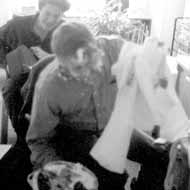
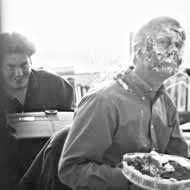
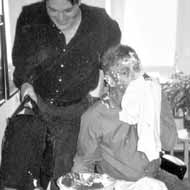
I’m in the States this week. Every time I come home, it’s a shock. What a desert this place is. What orgies of self-congratulation one is subjected to all day long here. There are posters everywhere advertising the new Pearl Harbor movie, starring Cuba Gooding Jr., which will doubtless depict heroic American servicemen struggling against slanty-eyed enemies. The newspapers are filled with gloating stories about the arrest of bogeyman Slobodan Milosevic and the upcoming execution of Timothy McVeigh. About the latter there are many alarmist reports about a new book in which McVeigh told reporters that he considered the children who died in the bombing “collateral damage.” The editorials about this story range from calls to ban the book to angry and mortified denunciations of McVeigh’s utter cold-bloodedness. Not once have I seen it mentioned anywhere that McVeigh borrowed the term “collateral damage” from the U.S. Army, which also used it describe the children it killed on its “necessary” missions.
Euphemisms. Even a hick killer like McVeigh knows enough to see through the ones put over on us day in and day out by our media priests. If it’s not “collateral damage,” then it’s “acceptable risk”; if it’s not “acceptable risk,” then it’s Max Frankel’s “prudent silence”; and if it’s not that, it’s Michael Wines and his “explainable reprehensible acts.” It seems like every time you turn on the television or pick up a newspaper in this country, you get a face full of bullshit. And no one ever apologizes to you for it. They act like it’s right, like you deserve it.
Then, if you complain too loudly, they tell you to watch your language. Be nice, they say, and we’ll take the matter under consideration. Here’s the way Wines put it in his letter to FAIR:
“And finally, to those who dispatched abusive and foul language: I’m not sure why e-mail has made some people feel they are empowered to curse and demean total strangers, but it’s definitely a phenomenon. I suggest that you wait an hour and reread your words before pressing the ‘send’ button. You will save yourself considerable embarrassment and increase the chances that your respondent will consider your arguments.”
Message to Michael Wines: we’re not really interested in having our respondent “consider our arguments.” What we are interested in is wanking off a horse into your face. And we did it. Somehow, we don’t feel all that embarrassed. But maybe we will when we e-mail the photo to every colleague you have at The Times.
We’ll let you know.
This article first appeared in The eXile, April 5, 2001.
Read more: hack, horse, new york times, putin, sperm, Matt Taibbi, eXile Classic, Feature Story


Got something to say to us? Then send us a letter.
Want us to stick around? Donate to The eXiled.
Twitter twerps can follow us at twitter.com/exiledonline







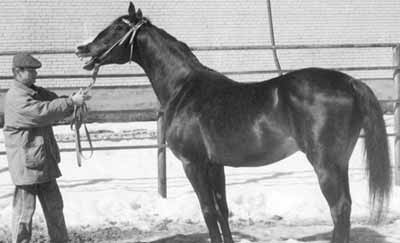
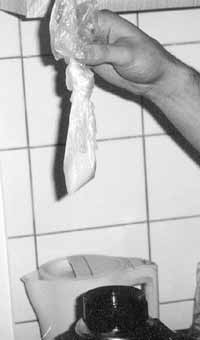


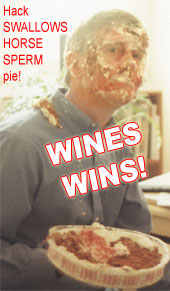


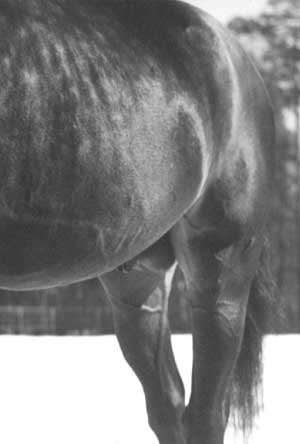
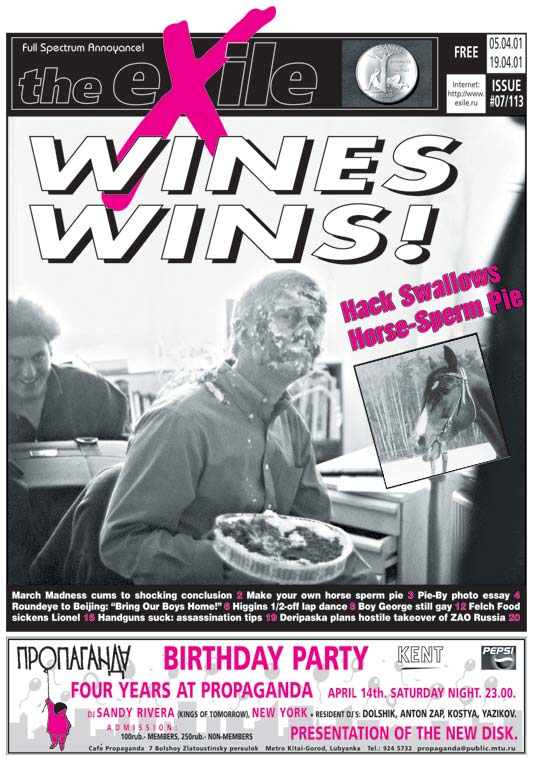

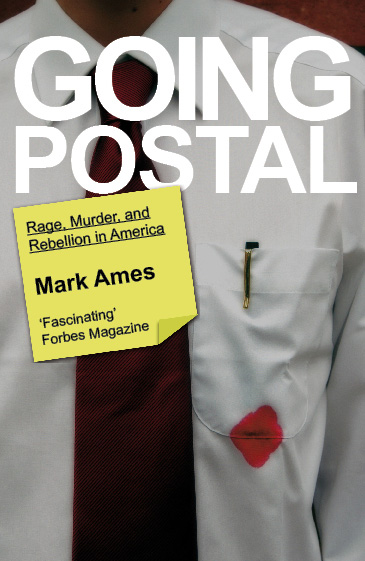









9 Comments
Add your own1. DERP | January 31st, 2010 at 1:13 pm
Simply fucking epic.
2. Jen | February 26th, 2010 at 5:28 pm
Fuck. YES.
3. john | March 19th, 2010 at 3:57 am
HAAHAHAHAHAHAHAHAHHA!!!!
4. Ann | November 9th, 2010 at 7:26 am
Wines seems like a real dick; it’s sad that you guys are so sanguine about stooping to his level. Assaulting someone with an utterly byzantine level of premeditation, simply because you REALLY don’t respect the way he does his job. And you want people to know this?
5. Dave Harris | November 9th, 2010 at 11:34 am
You guys are a-holes, even if he is a “hack.” Move to Damascus and enjoy living under dictatorship.
6. Benjerman Brabbs | August 5th, 2011 at 8:34 pm
BLOO BLOOOOOO A WORTHLESS GENOCIDE APOLOGIST GOT PRANKED BLOOO BLOOOOOOOO WE’RE NO BETTER THAN HIM NOW
shut the fuck up you liberal pussies
7. YankeeFrank | January 18th, 2012 at 7:45 pm
I’m late to the party but fuck all y’all who don’t think this is incredibly hilarious and appropriate for a genocide-loving apologist (as long as its “our side” doing/supporting the killing). In fact, he deserves much worse but, if I may speak for them, the exile doesn’t believe in assassination. Wines and his ilk are the reason our nation is such an immoral dick-suck place — careerist scumbags willing to do or say whatever the powerful want them to make misery and death not just possible, but inevitable. Screaming how communists are worse is besides the point. Fascist, communist, capitalist, whatever — anyone that enables murder, poverty and misery is reprehensible whatever their supposed “beliefs”.
8. Peaches | November 10th, 2012 at 8:43 am
I want the follow up: did these kids ever grow up?
9. Daniel | November 2nd, 2014 at 6:38 pm
Which kids? Matt Taibbi evidently did. http://pando.com/2014/11/02/everybody-sucks-except-matt-taibbi/
Leave a Comment
(Open to all. Comments can and will be censored at whim and without warning.)
Subscribe to the comments via RSS Feed